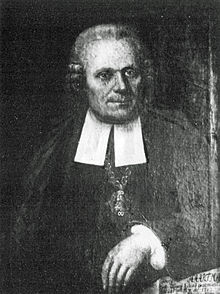| The Right Reverend Jakob Haartman | |
|---|---|
| Bishop of Turku | |
 | |
| Church | Church of Sweden |
| Diocese | Turku |
| Appointed | 13 August 1776 |
| In office | 1776–1788 |
| Predecessor | Carl Fredrik Mennander |
| Successor | Jakob Gadolin |
| Orders | |
| Ordination | 1758 |
| Consecration | 1776 by Carl Fredrik Mennander |
| Personal details | |
| Born | (1717-03-08)8 March 1717 Stockholm, Sweden |
| Died | 6 March 1788(1788-03-06) (aged 70) Turku, Finland |
| Denomination | Lutheran |
| Parents | Johan Jakobsson Haartman & Maria Kristoffersdotter Sundenius |
| Spouse | Eleonora Elisabet De la Myle |
Jakob Haartman (8 March 1717 - 6 March 1788) was the Bishop of Turku in Finland from 1776 till his death in 1788.
Biography
Haartman was born on 8 March 1717 in Stockholm, Sweden, the son of Finnish parents Johan Jakobsson Haartman, a priest, and Maria Kristoffersdotter Sundenius. He graduated from the Royal Academy of Turku in 1730 and from Uppsala University in 1733. He earned his master's degree from the Royal Academy of Turku in 1741. In 1742 he became an associate professor of Philosophy and a deputy librarian in 1750, a deputy secretary in 1755 and a professor of Philosophy and History in 1756. He was ordained a priest in 1758.
He was elected Bishop of Turku and Deputy Chancellor of the Royal Academy of Turku on 13 August 1776. He was chosen by Gustav III of Sweden to be the Godfather of Crown Prince Gustav Adolf at his baptism on 10 November 1778. Haartman was married to Eleonora Elisabet de la Myle (1726-1810). He died in Turku on 6 March 1788.
References
- HAARTMAN, Jakob. Retrieved on 10 April 2019.
External links
- [REDACTED] Media related to Jakob Haartman at Wikimedia Commons
| Religious titles | ||
|---|---|---|
| Preceded byCarl Fredrik Mennander | Bishop of Turku 1776 — 1788 |
Succeeded byJakob Gadolin |
| Archbishops of Turku | ||
|---|---|---|
| Pre-Reformation Catholic Church in Swedish Finland (1164–1554), Protestant Church of Sweden (1554–1817), Evangelical Lutheran Church of Finland (1817—present) | ||
| 12th century |  | |
| 13th century | ||
| 14th century |
| |
| Reformation | ||
| 17th century | ||
| 18th century | ||
| 19th century | ||
| 20th century | ||
| 21st century | ||